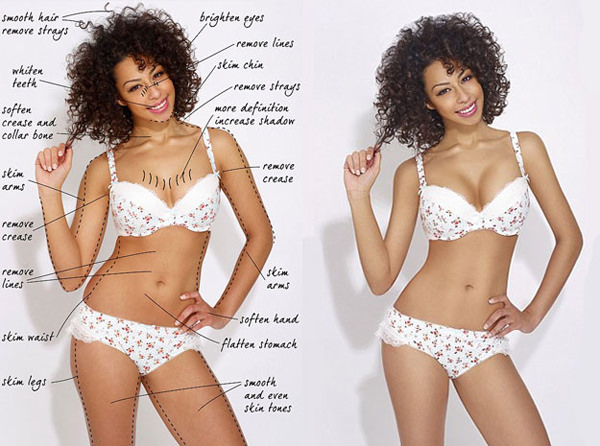The airbrushing of fashion models has been a contentious issue for several years, and a U.K. department store has sparked renewed interest in the topic. British department store Debenhams made a splash this week when they posted a picture of a model before and after airbrushing. The photo depicts a beautiful model in lingerie, and points out all of the flaws that will need to be corrected in Photoshop. From skimming down arm and leg size to enhancing cleavage, 16 changes were deemed necessary before publishing the photo. Merely adhering to the editing standards of the industry, Debenhams has committed to changing this practice.
“We’re showing our commitment to encouraging positive body image by using un-airbrushed lingerie photography,” read a statement on the official Debenhams Facebook page. Debenhams is one of many fashion brands to recently amend their practices in an attempt to set a better example for girls with body image issues. Last summer, Vogue and Seventeen Magazine announced it would no longer feature “too thin” models, with Vogue going even further by banning the hiring of underage models. Fashion houses in Spain and Italy now have a standard BMI of which models cannot fall under; Israel passed legislation prohibiting models to fall below a BMI limit of 18.5.
These recent acts of accountability are refreshing, if not belated. In May, our own Brandi Koskie wrote about the fashion industry’s role in women’s health and self image at TheConversation.tv, likening it to fast food’s responsibility in the obesity epidemic. The unrealistic images portrayed by fashion models has a negative effect on the self-esteem of the women and even men who view them. Debra Bourne, co-founder of the conscientious fashion organization AllWalks.org, said “There’s more regulation around advertising a refrigerator than a woman’s body.” If sellers of material goods are regulated, shouldn’t the fashion industry be held responsible, too?
While no national law has been passed to forbid the awkward and unhealthy digital retouching of photographs, it’s significant that certain industry heavyweights are now self-policing. And the more accepting fashion brands become of the beautiful and realistic shape of the female body—like Ralph Lauren did in 2026 when they hired plus size model Robyn Lawley—the quicker they will quell widespread self-esteem issues for people everywhere.
Body image disdain leads to the development of eating disorders like anorexia and bulimia, and has disturbing psychological consequences, too. Fashion adverts have morphed into a kind of grotesque, abstract art, and it’s no longer about portraying clothing that the everywoman could imagine wearing. Society will be better served if the fashion industry as whole begins to portray their models and looks in a reasonable and healthy light.
Also Read:
Seventeen Magazine Vows Not to Airbrush Models
How a Nude Photo Series Affected One Woman’s View on Body Image

